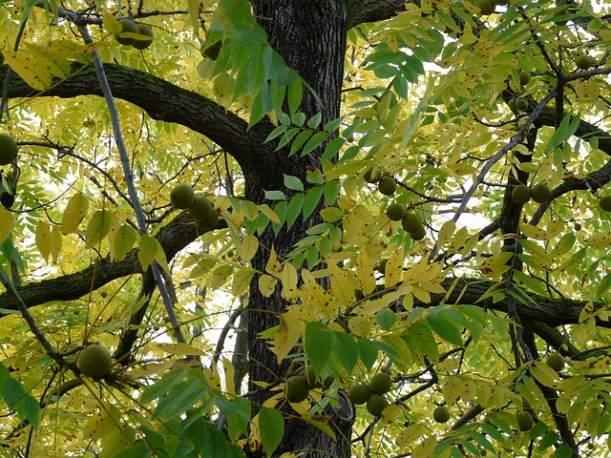 Black walnut trees can grace a yard, provide plenty of shade on hot summer days, and produce delicious nuts that both humans and squirrels enjoy. But those same trees aren’t always the best neighbours for the rest of the plants found in the garden.
Black walnut trees can grace a yard, provide plenty of shade on hot summer days, and produce delicious nuts that both humans and squirrels enjoy. But those same trees aren’t always the best neighbours for the rest of the plants found in the garden.
Walnuts are members of the Juglandaceae family and produce a chemical called juglone that is toxic to many plants and vegetables. Juglone is found in every part of the tree but is most prevalent in the flower buds, nut hulls and roots. And those roots can extend up to four times the diameter of the tree’s canopy.
The science behind juglone is that this chemical is a respiration inhibitor which deprives sensitive plants of needed energy for metabolic activity, thereby causing nearby plants to struggle to survive, or not survive at all. Symptoms of walnut toxicity range from stunted growth, to partial or total wilting, to death of the affected plant. The toxic reaction often occurs quickly and sensitive plants can go from healthy and vibrant to dead within a couple of days.
So what does this mean for gardeners that want a diverse, vibrant garden?
- There is actually a long list of plants that are tolerant to juglone (see below), but if the plant begins to looks stressed or is struggling to grow, it might be best to remove or relocate it.
- Plant as far away as possible from the black walnut. Consider using raised beds to move the roots further away from any contamination in the ground. Remove any debris or nuts that do gather in the bed and ensure good drainage – it seems to help.
- The toxicity can remain in the soil for years once the tree has been removed – the only way to truly ensure elimination is to remove all the roots as well.
- Juglone will eventually break down in composted leaves, but it takes time. It’s best to either dispose of the leaves or compost them separately and use that compost on non-sensitive plants.
| Plant Type | Sensitive to Juglone | Tolerant of Juglone |
| Vegetables | Cabbage | Squash |
| Tomatoes | Melon | |
| Peppers | Beans | |
| Potatoes | Carrots | |
| Eggplant | Corn | |
| Asparagus | Beets | |
| Rhubarb | Onion | |
| Parsnip | ||
| Flowers | Peony | Aster, Astilbe, Bee Balm, |
| Petunia | Black-eyed Susan, Crocus, | |
| Chrysanthemum | Daylily, Ferns, most Hostas, | |
| Forget-me-not | Hollyhock, Impatiens, | |
| Autumn crocus | Marigold, Morning Glory, | |
| Pansy, Phlox, Zinna | ||
| Shrubs and Vines | Azalea, Blackberry – most | Black Raspberry, Clematis, |
| Berries other than the black | Current, Forsythia, Euonymus, | |
| Raspberry, Hydrangea, Lilac, | Honeysuckle, Rose-of Sharon, | |
| Potentilla, Yew | Sumac, Pachysandra, | |
| Viburnum, Virginia Creeper, | ||
| Willow, Witch Hazel |
